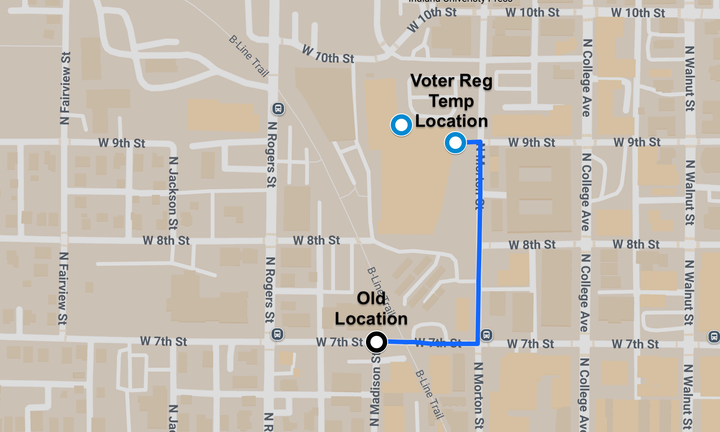Judge dismisses lawsuits by former Monroe County employee, but amended complaints to be filed
A judge granted motions to dismiss two separate lawsuits by a former employee of Monroe County government. But under Indiana trial court rules, Lisa Jeneé Trimble will have 10 days to file amended complaints, which she indicated to the court Friday morning that she plans to do.


At a hearing on Friday morning, special judge Lucas Rudisill granted motions to dismiss two separate lawsuits by a former employee of Monroe County government. But that’s not the end of the story.
Under Indiana trial court rules, Lisa Jeneé Trimble will have 10 days to file amended complaints, which she indicated to the court Friday morning that she plans to do. Monroe County is using outside counsel for defense of both lawsuits. Trimble is representing herself.
Before Friday’s hearing, Trimble did not respond in writing to the motions to dismiss, telling the judge on Friday, she did not realize she was supposed to do that, and meant no disrespect to the court by not filing responses.
Rudisill granted the county's motion to dismiss both lawsuits for “failure to state a claim upon which relief could be granted.” It’s a technical legal phrase that means if all the alleged facts are assumed to be true, there is no law under which the court could award damages.
Friday’s hearing considered just the information contained inside the “four corners” of the documents in Trimble’s complaints, and did not involve additional introduction of evidence or testimony from witnesses.
Trimble worked in the Monroe County assessor’s office until October 2024, when she left amid allegations of harassment and retaliation. She then started work in the Monroe County auditor’s office as accounts payable administrator, a position she held until her termination in mid-May of 2025.
Part of the background to Trimble’s lawsuits is a complaint she filed with Indiana’s Department of Local Government Finance (DLGF) about county assessor Judy Sharp, which Trimble contends led to her unfair treatment by Monroe County government. The DLGF concluded there was no wrongdoing by Sharp in her responsibilities to assess property values.
On Friday morning, Rudisill told Trimble that the 10-day deadline for filing an amended complaint would start when he issued his written order, which he expected would be the same day.
Two lawsuits
Trimble’s first lawsuit was filed at the end of April, against a raft of defendants, making a broad range of allegations involving: workplace harassment by county assessor Judy Sharp; inaction by employee services and the legal department; defamation by the county auditor; misuse of authority; false allegations about misuse of county equipment; health impacts; and a failure to investigate complaints in a timely way, among other claims.
Trimble’s second lawsuit, against Monroe County auditor Brianne Gregory, was filed at the end of May, and was more focused on her termination from the auditor’s office. In addition to unlawful termination after leaving work with supervisor approval, the second lawsuit alleges: retaliation tied to whistleblowing about alleged fraud in the assessor’s office; violation of county personnel policies and state law; ongoing harassment, connected to her earlier complaints; negligence leading to emotional distress and physical health impacts including alopecia and autoimmune flareups; financial and personal costs from pursuing harassment claims.
Arguments for dismissal
Arguing for all the defendants in the first lawsuit on Friday morning was Pam Schneeman, with Clark Johnson & Knight. Schneeman ticked through the defendants individually, telling the judge why the lawsuit against them should be dismissed.
Monroe County employee services and the Monroe County legal department lack the legal capacity to be sued under Indiana law, Schneeman said. Because those departments have no independent legal existence apart from the county itself, the lawsuit against them has to be dismissed, she said.
The Monroe County commissioners, according to Schneeman, also should not remain as defendants in the case—because the only fact about them that Trimble alleged is that they were notified of Trimble’s complaint to the DLGF about elected county assessor Judy Sharp. County commissioners have no control over the elected assessor’s office, Schneeman said, so there’s nothing commissioners might have done to take up Trimble’s cause with Sharp.
As for human resources administrator Elizabeth Sensenstein, Scheeneeman said that her only involvement was telling Trimble that her investigation had found no policy violation, which is not grounds for a lawsuit, Scheeman said.
Another named defendant was human resources assistant director Seth Elgar, who is alleged to have attended a meeting, requested a check of a county-owned computer, and sent out a workplace-respect training video. Schneeman told the court that none of those actions create liability under Indiana law.
Schneeman said county attorney David Schilling did nothing beyond meeting with employees to discuss personnel issues, which is not enough to support an actionable claim against him, Schneeman said.
Finally, Schneeman said that the lawsuit against assessor Judy Sharp should also be dismissed. Trimble’s assertions that Sharp harassed, bullied, or defamed her are conclusory, lacking the specific facts required under Indiana’s pleading standards, Schneeman said.
Scheeman said a plaintiff can't just toss out legal terminology like “harassment” and “defamation” and use those words alone to support a claim. The only specific allegations against Sharp—like displaying property records for the house where Trimble lives onscreen in a training session, and meeting with other officials about Trimble’s complaint with the DLGF, or requesting a computer check—are not unlawful, Schneeman said.
Arguing in defense of Monroe County auditor Brianne Gregory in the second lawsuit on Friday morning was Justin Schaefer, with Barnes Maloney. Schaefer contended that there are no specific allegations of criminality, personal benefit, or willful misconduct by Gregory, and that Trimble’s complaint doesn’t support claims against Gregory in either her individual or official capacity.
About Gregory’s wrongful termination claim, Schaefer said Trimble plaintiff did not allege that her firing was solely due to the exercise of a statutory right, as required by Indiana law. Schaefer added that there were lawful grounds for Trimble’s termination. Trimble’s other claims, like bullying and harassment also lacked sufficient factual support in the complaint, Schaefer said, in order for the lawsuit to proceed.
Complaint with the DLGF
In mid-May, Trimble filed a wide-ranging formal complaint with Indiana’s DLGF (Department of Local Government Finance) with several attachments about the Monroe County assessor’s office. Indiana state law lays out a process for making complaints about county assessors. Based on county assessor Judy Sharp’s response, and its own investigation, the DLGF issued a final determination in early August concluding there had been no violations of state law.
Trimble’s complaint filed with the DLGF alleged harassment and retaliation while employed in the assessor’s office, as well as improper assessment practices. The complaint alleged that county officials “chased sales,” manipulated ratio studies, assessed vacant land and mobile homes incorrectly, targeted individuals, allowed staff to assess their own properties, and threatened homeowners that appeals could lead to higher tax bills.
In its final determination, the DLGF said it had no authority to investigate Trimble’s workplace harassment allegations.
On the tax-related claims, the agency reviewed information from Trimble and county officials, and analyzed property data and ratio studies. The DLGF said it found “no evidence” of violations of Indiana’s property tax code. Claims about manipulated ratio studies were checked by statisticians, according to the DLGF. The report put its conclusion like this: “The Division found that overall, the randomly sampled parcels matched almost exactly between the abstract and the ratio study workbook.”
In the DLGF’s final determination, concerns about vacant land, mobile homes, and reassessment practices were deemed matters of local control that can be challenged through the normal appeals process. The agency also said documentation showed changes to the property record card for the home that Trimble rents were based on actual remodeling and permit activity, not “targeting.”
Documents
- April 30, 2025: Filed complaint for damages 53C06-2504-CT-001224 against multiple defendants.
- May 30, 2025: Filed complaint for damages 53C06-2505-CT-001496 against Monroe County auditor
- June 6, 2025: Brief in support of motion to dismiss 53C06-2504-CT-001224 against multiple defendants.
- July 25, 2025: Brief in support of motion to dismiss 53C06-2505-CT-001496 against Monroe County auditor




Comments ()